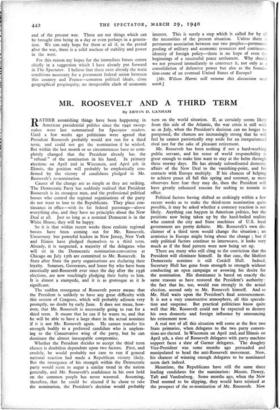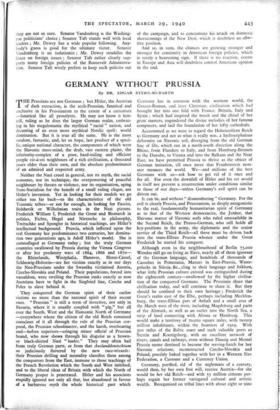MR. ROOSEVELT AND A THIRD TERM
By ERW IN D. CANHAM
RATHER astonishing things have been happening in American presidential politics since the 1940 sweep- stakes were last summarised for Spectator readers. Until a few weeks ago politicians were agreed that President Roosevelt probably would not run for a third term, and could not get the nomination if he wished. But within the last month or so circumstances have so com- pletely changed that the President already has the " refusal " of the nomination in his hand. In primary elections on April 2nd in Wisconsin, and April 9th in Illinois, the position will probably be emphatically con- firmed by the victory of candidates pledged to Mr. Roosevelt's re-nomination.
Causes of the change are as simple as they are striking. The Democratic Party has suddenly realised that President Roosevelt is its strongest man, and the professional political bosses who control the regional organisations of the party do not want to lose to the Republicans. They place con- tinuance in office—with its fat federal patronage—above everything else, and they have no principles about the New Deal at all. Just so long as a nominal Democrat is in the White House, they will be happy.
So it is that within recent weeks these realistic regional bosses have been coming out for Mr. Roosevelt. Unsavoury but powerful leaders in New Jersey, New York and Illinois have pledged themselves to a third term. Already, it is suspected, a majority of the delegates who will sit in the Democratic nomination-convention at Chicago on July 15th are committed to Mr. Roosevelt. In State after State the party organisations are declaring their loyalty. Senators, Governors, and lesser fry who have been caustically anti-Roosevelt ever since the day after the 1936 elections, are now touchingly pledging their fealty to him. It is almost a stampede, and it is as grotesque as it is significant.
The sudden resurgence of Roosevelt power means that the President is unlikely to have any great difficulty with this session of Congress, which will probably adjourn very promptly, no doubt by early June. It does not mean, how- ever, that Mr. Roosevelt is necessarily going to run for a third term. It means that he can if he wants to, and that he will be able to have a large share in the actual nominee if it is not Mr. Roosevelt again. He cannot transfer his strength bodily to a preferred candidate who is unpleas- ing to the Conservative wing of the party, but he can dominate the almost inescapable compromise.
Whether the President decides to accept the third term chance is doubtless dependent upon two factors. First, and crudely, he would probably not care to run if general national reaction had made a Republican victory likely. But the resurgence of his strength within the Democratic party would seem to augur a similar trend in the nation generally, and Mr. Roosevelt's confidence in his own hold on the common people has never wavered. Assuming, therefore, that he could be elected if he chose to take the nomination, the President's decision would probably turn on the world situation. If, as certainly seems likely from this side of the Atlantic, the war crisis is still with us in July, when the President's decision can no longer be postponed, the chances are increasingly strong that he will feel he cannot patriotically step aside for an inexperienced rival just for the sake of pleasant retirement.
Mr. Roosevelt has been nothing if not a hard-working public servant, and his sense of world responsibility is great enough to make him want to stay at the helm through these stormy days. He has already subordinated domestic affairs of the New Deal to the vanishing-point, and his contacts with Europe multiply. If his chances of helping to achieve peace all fail this spring and summer, as most observers here fear they may do, then the President will have greatly enhanced reasons for seeking to remain in office.
Political factors having shifted so strikingly within a few recent weeks as to make the third-term nomination quite possible, it may be asked whether a contrary reaction is not likely. Anything can happen in American politics, but the positions now being taken up by the hard-boiled realists who control the city and State machines of U.S. local government are pretty definite. Mr. Roosevelt's own dis- claimer of a third term would change the situation ; an armistice in Europe might bring about the change ; but if only political factors continue to interweave, it looks very much as if the final pattern were now being set up.
There are many who still cling to the conviction that the President will eliminate himself. In that case, the likeliest Democratic nominee is still Cordell Hull. Indeed, Secretary Hull has gone from strength to strength without conducting an open campaign or avowing his desire for the nomination. His dominance is based on exactly the same reasons as have restored the President's authority: the fact that he, too, would run strongly in the actual election, second only to Mr. Roosevelt himself. And so Mr. Hull waits upon the President's final announcement.
It is not a very constructive atmosphere, all this specula- tion and suspense. But practical politicians know quite well that Mr. Roosevelt could not be expected to destroy his own domestic and foreign influence by announcing his retirement now.
A real test of all this situation will come at the first two State primaries, when delegates to the two party conven- tions are elected. In Wisconsin on April 2nd, and Illinois on April 9th, a slate of Roosevelt delegates with party machine support faces a slate of Garner delegates. The doughty Vice-President was some months ago persuaded and manipulated to head the anti-Roosevelt movement. Now, his chances of winning enough delegates to be nominated seem dark indeed.
Meantime, the Republicans have still the same three leading candidates for the nomination: Messrs. Dewey, Taft and Vandenberg. Some months ago, when the New Deal seemed to be slipping, they would have rejoiced at the prospect of the re-nomination of Mr. Roosevelt. Now they are not so sure. Senator Vandenberg is the Washing- ton politicians' choice ; Senator Taft stands well with local leaders ; Mr. Dewey has a wide popular following. Any- body's guess is good for the ultimate victor. Senator Vandenberg is an isolationist ; Mr. Dewey straddles the fence on foreign issues ; Senator Taft rather clearly sup- ports many foreign policies of the Roosevelt Administra- tion. Senator Taft wisely prefers to keep such policies out of the campaign, and to concentrate his attack on domestic shortcomings of the New Deal, which is doubtless an effRe- tive position.
And so, in sum, the chances are growing stronger and stronger for continuity in American foreign policies, which is surely a heartening sign. If there is no reaction, events in Europe and Asia will doubtless control American opinion in the end.



































 Previous page
Previous page